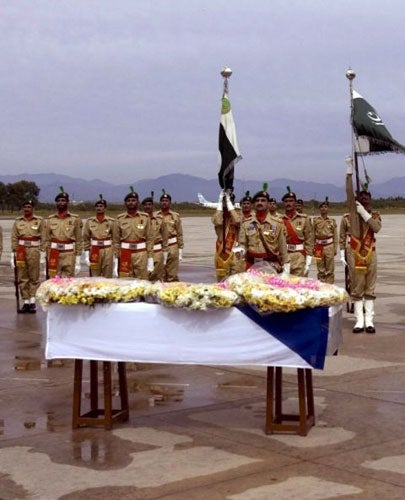Pakistan blames US raids for hotel bombing
Pakistan President pleads with Bush to reverse policy as BA cancels all flights to country

Your support helps us to tell the story
From reproductive rights to climate change to Big Tech, The Independent is on the ground when the story is developing. Whether it's investigating the financials of Elon Musk's pro-Trump PAC or producing our latest documentary, 'The A Word', which shines a light on the American women fighting for reproductive rights, we know how important it is to parse out the facts from the messaging.
At such a critical moment in US history, we need reporters on the ground. Your donation allows us to keep sending journalists to speak to both sides of the story.
The Independent is trusted by Americans across the entire political spectrum. And unlike many other quality news outlets, we choose not to lock Americans out of our reporting and analysis with paywalls. We believe quality journalism should be available to everyone, paid for by those who can afford it.
Your support makes all the difference.The Pakistani President, Asif Ali Zardari, will plead with President George Bush today to change a policy which is being blamed for one of his country's worst terrorist atrocities.
"We hope the US will change policy because this is what is needed," said Pakistan's ambassador to the UK, Wajid Shamsul Hassan, after 53 people were killed and more than 250 injured in the bombing of the Marriott Hotel in Islamabad. He argued that the Bush administration's decision to allow cross-border incursions from Afghanistan into Pakistan, including by ground forces on at least one occasion, had been counterproductive "because they are not killing high-value targets, they are killing civilians".
Mr Zardari's talks with President Bush in New York, on the sidelines of the UN General Assembly, have been scheduled amid heightened security fears in the wake of the bombing.
Yesterday BA cancelled all flights to Pakistan as a precaution, although a spokesman said there was no direct threat against the airline, which operates six flights each week. A number of foreign embassies and businesses in the country are also said to be re-examining the security situation.
In the north-western city of Peshawar, Abdul Khaliq Farahi, Afghanistan's designated ambassador to Pakistan, was kidnapped and his driver killed by unidentified gunmen.
Overnight on Sunday there was further tension on the border when Pakistani troops reportedly fired shots to warn off two US helicopters that were attempting to cross into Pakistan at Alwara Mandi in North Waziristan.
A senior Pakistani official claimed that Pakistan's senior leaders were to have attended a dinner at the Marriott Hotel but changed their venue to the Prime Minister's house just hours before the massive bomb devastated the building.
The Interior Ministry chief, Rehman Malik, said the decision to move the location of the dinner for the President and Prime Minister had been kept secret but did not provide details of why the switch was made.
However, it later emerged that the invitations to the Prime Minister's residence were sent out 10 days ago.
"The dinner was never going to be at the Marriott," said Talat Hussain, a political analyst and director of current affairs at Aaj TV. "We were all issued invitations well in advance that it was to take place at the Prime Minister's house. And by claiming that they had managed to move the political leadership to another location, it asks the question, if there is a security threat, is it only for VIPs? Are the rest of us children of a lesser god?"
Mr Malik could not be reached for further clarification last night.
Who carried out Saturday night's attack remains unclear. Mr Malik had previously said the hotel was attacked by Taliban or al-Qa'ida militants simply because it was a Western target.
But his remarks raise the question as to why – if the government had received intelligence that the Marriott might be attacked – was security at the hotel not immediately increased.
The attack on the hotel and the shockwaves it has sent through Pakistan are just the latest challenges confronting the country's civilian leadership and its recently elected president, Mr Zardari. Under pressure from the US, Mr Zardari, the widower of the former prime minister Benazir Bhutto, has vowed to continue the battle against Islamic militants operating in the country's tribal areas despite growing resentment inside Pakistan about interference from Washington.
Mr Hassan said that the Pakistan President had gained the support of Gordon Brown in opposing the US raids on Pakistani territory, during talks in London last week.
Mr Zardari is to chair the first meeting of the Friends of Pakistan – grouping the US, Britain and the other G8 countries as well as the United Arab Emirates, Saudi Arabia and China – in New York on Friday. Pakistan is looking for short-term help for economic measures to stimulate employment, and longer-term assistance for social development in deprived areas.
53
The number of people killed in suicide bomb attack on the Marriott Hotel in Islamabad.
Join our commenting forum
Join thought-provoking conversations, follow other Independent readers and see their replies
Comments